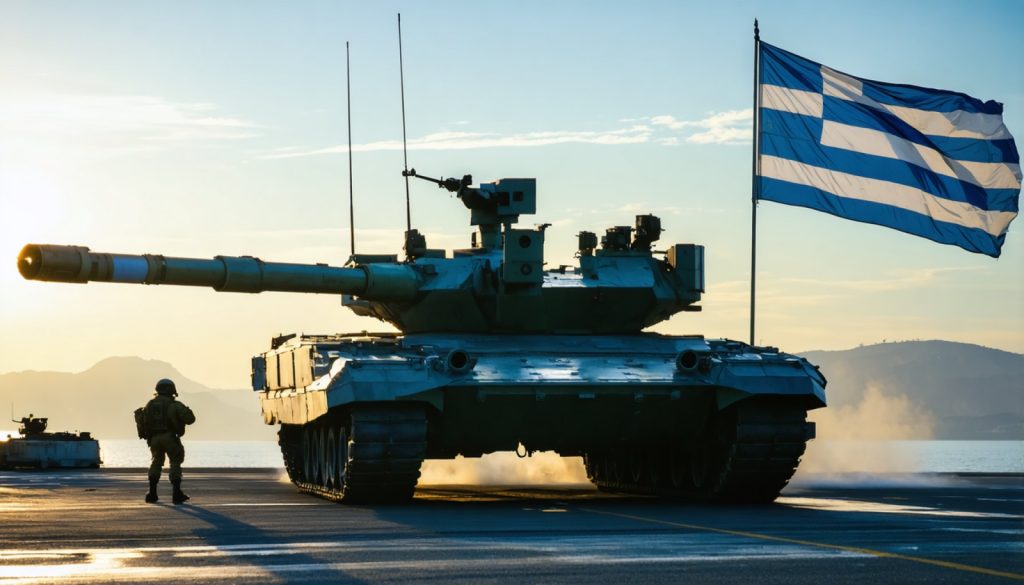
- Greece is undertaking a €25 billion defense overhaul, branded “Achilles Shield,” emphasizing technology and innovation in military strategy.
- The plan integrates AI-driven missiles and unmanned drones, transforming Greece’s military from traditional formations to advanced systems.
- Defense Minister Nikos Dendias highlights Greece’s shift to interconnected systems and cutting-edge soldier gear equipped with sensors.
- The overhaul includes collaboration with local tech innovators and a restructuring of human resources toward agility and modernization.
- Greece strengthens alliances with France, Israel, and the U.S., focusing on acquiring American F-35s to enhance fighter jet capabilities.
- The initiative reflects a deep philosophical shift towards digital warfare, ensuring resilience rooted in both legacy and innovation.
As the azure waters of the Aegean Sea reflect a history of tension, Greece is charting a bold new course into the future of warfare. In a grand declaration dripping with the urgency of innovation, officials unveiled plans for an expansive €25 billion ($27 billion) defense overhaul. This isn’t merely an adjustment; it’s a revolution poised to catapult Greece into an era defined by technology that seems a few clicks ahead of its time.
Envision a defense strategy adorned with the hallmarks of science fiction: fleets that rely not on mighty naval vessels, but on sophisticated, AI-driven missiles, and unmanned drones that patrol the skies with silent vigilance. This new strategy, aptly named the “Achilles Shield,” forms the bulwark of Greece’s efforts to address simmering tensions with Turkey. These neighbors, long beleaguered by disputes over the Aegean’s vast maritime canvas, will see Greece’s military standing transformed from traditional formations to digital webs of mobile deterrence.
Defense Minister Nikos Dendias vividly underscored this seismic shift, painting a picture of a future bristling with interconnected, intelligent systems. Greek soldiers might soon shed their old gear for cutting-edge uniforms bristling with sensors—akin to superheroes granted an omniscient edge in an unpredictable theater of operations. Above them, satellites will etch invisible but unbreakable lines of communication, ensuring clarity amidst conflict’s chaos.
Such sweeping change demands more than technological wizardry; it calls for a renaissance of partnerships and reorganization. Greece’s plan weaves local tech innovators into the military tapestry, while it reassesses and rebalances its human resources, shedding obsolete practices for a streamlined, agile command structure. This rebirth occurs under the long shadow of Europe’s heightened military preparations post-Ukraine conflict, and in the wake of shifting transatlantic defense responsibilities.
The proposition reaches far beyond mere asset acquisition; it embodies a philosophical pivot, a doctrinal metamorphosis underscored by recent high-level dialogues with allies France, Israel, and the United States. Prime Minister Kyriakos Mitsotakis has championed these ties, doubling down on U.S. collaborations to bolster Greece’s fighter jet capabilities with American F-35s, dismissing clamorous appeals to consider European alternatives.
The heart of this “existential” initiative is not just about countering immediate threats. It’s a statement of intent, a vision that trusts the future of warfare will be written in lines of code as much as in lines of defense. Greece’s ambitious leap forward entwines its legacy with innovation, ensuring that when the world looks toward the storied Aegean, it sees not just history, but the shimmer of technology-fueled resilience.
Greece’s €25 Billion Defense Revolution: What You Need to Know
Introduction
As Greece rolls out an ambitious €25 billion defense overhaul, the “Achilles Shield” initiative is poised to transform the nation’s military landscape. This strategic vision combines cutting-edge technology and international partnerships to address both historical and emerging threats, particularly across the contested waters of the Aegean Sea.
Key Features of the “Achilles Shield” Initiative
1. AI-Driven Warfare and Advanced Technology: A significant component of Greece’s defense strategy is its reliance on AI-driven missiles and unmanned aerial drones. The integration of AI allows for more precise targeting and reduced human risk in combat scenarios.
2. Interconnected Systems: Greece aims to implement highly interconnected defense systems, ensuring seamless communication and cooperation across all military branches. Satellites will play a crucial role in maintaining communication lines even in the most chaotic theaters of war.
3. Modernization of Personnel Equipment: Greek soldiers will be equipped with advanced uniforms incorporating sensor technology to enhance situational awareness and operational efficiency. This modern “superhero” gear is intended to provide troops with real-time data analytics on the battlefield.
4. Strategic Partnerships: Greece is cultivating robust defense collaborations with allies such as France, Israel, and the United States. A notable aspect is the acquisition of American F-35 fighter jets, underscoring a pivot towards U.S. defense systems over European alternatives.
5. Local Tech Innovation: The initiative leverages local tech developers, integrating their skills and innovations into the military apparatus to maintain a technological edge.
Pressing Questions and Expert Insights
Why a €25 Billion Investment?
This substantial investment reflects Greece’s commitment to not only modernize its military but to strategically position itself within a rapidly changing global defense landscape. The ongoing tensions with Turkey, coupled with Russia’s aggression in Ukraine, have underscored the importance of resilience through technology.
How Will This Impact Greece and Turkey Relations?
While Greece’s defense strategy is largely a response to historical tensions in the Aegean Sea, it is designed to be a deterrent rather than a provocation. The technology-driven approach aims to establish a stable defensive stance without escalating into an arms race.
What Does This Mean for Global Defense Trends?
Greece’s defense transformation is emblematic of a broader shift towards digital warfare and intelligent systems. Other nations may follow suit, investing in AI and unmanned technologies to gain strategic advantages.
Pros and Cons Overview
Pros:
– Enhanced Defense Capabilities: Improved deterrence and defense mechanisms through AI and advanced technology.
– Reduced Casualties: With an emphasis on unmanned systems, human risk in hostile scenarios can be significantly minimized.
– Economic Growth: Boost in local tech sectors through military contracts and collaboration.
Cons:
– Escalation Risks: Increased military capabilities may heighten tensions in the region.
– Dependency on Technology: Over-reliance on technology could pose vulnerabilities, particularly regarding cybersecurity threats.
Actionable Recommendations and Quick Tips
– For Investors: Keep an eye on Greek tech firms, as their integration into defense strategies could lead to lucrative opportunities.
– For Policymakers: Balance technological investments with diplomacy to manage regional tensions effectively.
– For Researchers: Explore AI applications in defense for potential collaborations with Greek military research units.
For more information on Greece’s defense strategy and technological developments, visit the Greece government official site.
In conclusion, Greece’s “Achilles Shield” initiative is more than a military upgrade; it is a declaration of strategic foresight, leveraging technology to secure a peaceful and resilient tomorrow.



